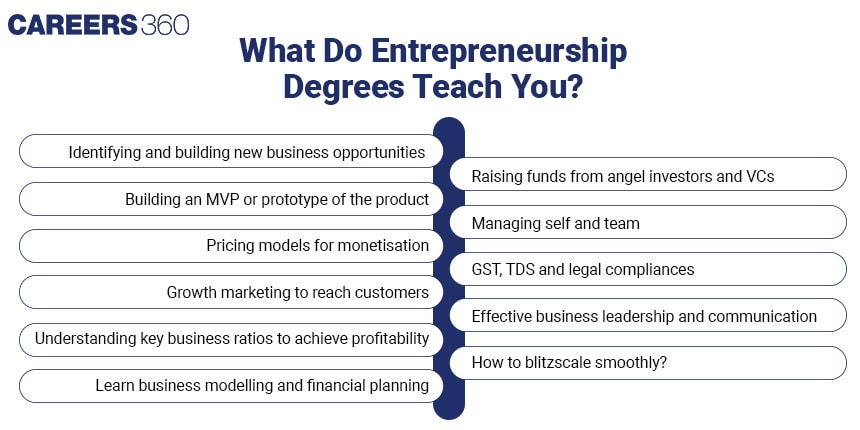Does It Help To Pursue A Degree In Entrepreneurship?
Salary is the drug they give you to forget your dreams. This phrase has become quite popular amongst today's youth who want to chase jobs with independence and a higher purpose than one with just a higher salary. Many surveys have revealed the changing needs of people today to reflect the growing transition to pursue entrepreneurship as a long-term career.

If you are wandering the same path, thinking about whether entrepreneurship is the right career choice for you and whether doing a formal degree helps the cause, let us help you find the answer.
Do entrepreneurs really require a degree?
Entrepreneurship is a practical field, so why does anybody need a degree? The question is correct, but not to a larger extent.
Entrepreneurship requires domain knowledge of fields ranging from finance, technology, and marketing to hiring. It needs a solid theoretical understanding of the functions that must be executed. Hence, an entrepreneur is expected to know the basics of these subjects to run the business smoothly.
A degree helps to understand the subjects from a foundational perspective so that entrepreneurs can get the required knowledge to know how a small business works. It becomes the launchpad to kickstart an entrepreneur's journey.
Also Read | One Step at a Time: Why Rigid, Long-Term Career Planning Won't Always Work
Still not convinced? Let us talk about what degrees teach.
What Do Entrepreneurship Degrees Teach You?
Degrees in entrepreneurship cover aspects from idea generation to post-funding scalability. Let us understand this with the curriculum of the majority of such courses:
- Identifying and building new business opportunities
- Building an MVP or prototype of the product
- Pricing models for monetisation
- Growth marketing to reach customers
- Understanding key business ratios to achieve profitability
- Learn business modelling and financial planning
- Raising funds from angel investors and VCs
- Managing self and team
- GST, TDS and legal compliances
- Effective business leadership and communication
- How to blitzscale smoothly?
The entrepreneurship course covers the background data of building a startup from an idea to a scalable business proposition. It helps a first-time entrepreneur understand the challenges and pain points of building a successful startup from scratch.
But more than giving the theoretical framework of running a company, a formal degree does help in getting some other added advantages. Let us understand that in detail:
Other Benefits Of An Entrepreneurship Degree
Large Network Of Students: The benefit of doing a degree course is the access to an extensive network of students that someone gets. These students may be your co-founders, customers or even early investors for your startup. Your NetworkNetwork is your net worth in entrepreneurship.
Diversity of the Class: The beauty is the diversity of the class in a BBA/MBA class. The students are from different backgrounds and fields and bring a wide array of experiences. As wisely said, humans are the best books to read. Every experience and every lesson in the journey counts. You might also interact with students globally and understand the global landscape and the problems, which will help you while going global. These lessons are a goldmine and become a base learning ground for anyone aiming to become an entrepreneur. For example - If you are from a commerce background, you might get the opportunity to meet with engineers and learn the facets of emerging technologies from them.
Also Read | 8 Careers In Performing Arts For Those With A Creative Bent
Incubation/Funding Support: Many colleges offering entrepreneurship offer incubation and funding support to students. This support includes but is not limited to office space, mentorship support, equity-free grants and strategic partnership opportunities with relevant customer groups and institutions. For example - The incubators at IIT Bombay and IIM Ahmedabad have been some of the top incubators mentoring and funding early-stage startups, which the college students run.
Brand Image of an Alumni: A brand image helps in many ways to establish the trust and credibility of the founder. Though it may not be the deciding factor, a good college background puts the entrepreneur on a higher pedestal in the business world. And the best part is that the brand image is everlasting, so it can be used to an advantage anytime, especially for first-time founders.
 Entrepreneurship requires domain knowledge of fields ranging from finance, technology, and marketing to hiring.
Entrepreneurship requires domain knowledge of fields ranging from finance, technology, and marketing to hiring.
Change of Surroundings: A startup journey is very challenging, and there are several times an entrepreneur is stuck in it. Issues may be dynamic, ranging from commercialisation and funding to the supply chain and distribution of the product/service. A change in surroundings does help to release some of that pressure building in the mind of an entrepreneur. Pausing in your journey and going to study entrepreneurship enables you to get back to things from a fresh perspective later on.
High-Pressure Environment: A college perfectly creates a high-pressure environment with assignments, projects, vivas, and exam preparations - all done in a super-crunched timeline. The urge to excel from peers builds up even more pressure from the inside. A student who learns the art of prioritising goals and managing their time has the potential to go ahead and become a great businessperson.
Get A Creative Edge: The course also throws various practical assignments to you. From creating your pitch deck to interviewing a successful entrepreneur, the degree helps you get a creative edge in completing your tasks and projects.
After all - Entrepreneurship is all about creativity and innovation. Isn't it?
The benefits are well-rounded and boost a business journey from every lens. But, it is time to be the Devil's advocate and look at some of the cons that might put an overall thought to your decision.
Cons of doing an Entrepreneurship Degree
Lack of Monetary Support: Since entrepreneurship is a specialised course, the course fees are higher than any other regular course. A person lacking a solid financial background or monetary support would find it hard to afford it.
Time Off The Business: An entrepreneurship course (BBA or MBA) requires a lot of time and attention to the class and the myriad of assignments a student gets along the way. Though the course teaches the value of time management, that time is still from when you could be doing your business. There is always the opportunity cost you are chasing - learning on your own or through a degree.
Not Much For Second-time Founders: The course may not be helpful for a second-time founder who has already run a startup in the past. They would already have the Network, wherewithal and requisite knowledge. They may find little value in the degree.
Also Read | Career In Marketing: 4 Avenues To Know About
Understanding both sides of the table would help you decide whether to pursue a degree in entrepreneurship. Either way, entrepreneurship is about learning and unlearning new things outside your comfort zone. Developing the right mindset to think as an entrepreneur would help in entrepreneurship and life. The definition of an entrepreneur is someone who assesses risk and leverages it to make the best use of an opportunity at hand. Isn't it something supposed to be done in life too?
Popular Courses and Specializations
Popular Branches
Popular Courses
- MBA in Rural Management Course, Eligibility, Admission, Fees, Colleges, Syllabus, Subjects, Career
- B.Tech in Power System Engineering: Courses, Fees, Jobs, Scope
- B.A. Italian - Course, Eligibility, Admission, Syllabus, Scope
- Post Graduate Diploma in Accommodation Operation: Course, Exams, Fees, Colleges, Career
- B.A. Social Work - Course, Eligibility, Syllabus, Colleges, Fees, Career Scope
List of MBA colleges
Browse Bschool Colleges by State
Questions related to MBA
On Question asked by student community
There are several government and private colleges in India offering UGC-recognised Online MBA. Some of which are as follows:
Here are some useful article links for more read :
UGC Approved Online MBA Colleges in India 2026: Complete List, Fees,
There are several cheapest online MBA options like:
- IGNOU Online MBA
- KL Online MBA
- Andhra University
- Bharathiar University Online MBA
- Yenepoya Online MBA
Visit the links for more details :
Anyone who has completed a bachelor's degree is eligible for Online MBA . For some online MBA courses, especially for Executive MBA, you will require at least 2-3 years of relevant work experience and sometimes a valid CAT, MAT, or GMAT score.
For more, read Online MBA Admission: Eligibility, Selection
Yes, an online MBA degree is UGC-recognised which making it highly relevant in 2026. It holds the same value and credibility as a on-campus programme. Due to its flexible nature, working professionals and graduates prefer an MBA in online, flexible mode to upskill themselves while working.
It’s not available everywhere — you need to target states/institutions that officially recognize the KM quota for MBA admissions.
Some examples of MBA colleges with Kashmiri migrant quota-
1-symbiosis Institute of Business Management (SIBM), Pune
2-FORE School of Management, Delhi
3-Central University of Odisha (Koraput)
Applications for Admissions are open.
Ranked among top 10 B-Schools in India by multiple publications | Top Recruiters-Google, MicKinsey, Amazon, BCG & many more.
Amity University-Noida BBA Admissions 2026
ApplyAmong top 100 Universities Globally in the Times Higher Education (THE) Interdisciplinary Science Rankings 2026
Great Lakes Institute of Management PGPM Admissions 2026
ApplyExtended Application Deadline: 15th Feb | Globally Recognized by AACSB (US) & AMBA (UK) | 17.8 LPA Avg. CTC for PGPM 2025
SDA Bocconi IMB Admissions 2026
ApplyApplications Deadline - 23rd March 2026 | Offers full-time PGP in International Master in business (IMB) Equivalent to MBA under following specializations Marketing, HR, Operations, and many more
Navrachana University BBA Admissions 2026
ApplyRanked as the 3rd Best Private University in Gujarat by Education World
GITAM University | MBA Admissions 2026
ApplyNAAC A++ Accredited | AMBA & AACSB Member | Highest CTC 16.22 LPA | Merit-based Scholarships | Last Date: 19th Feb'26
